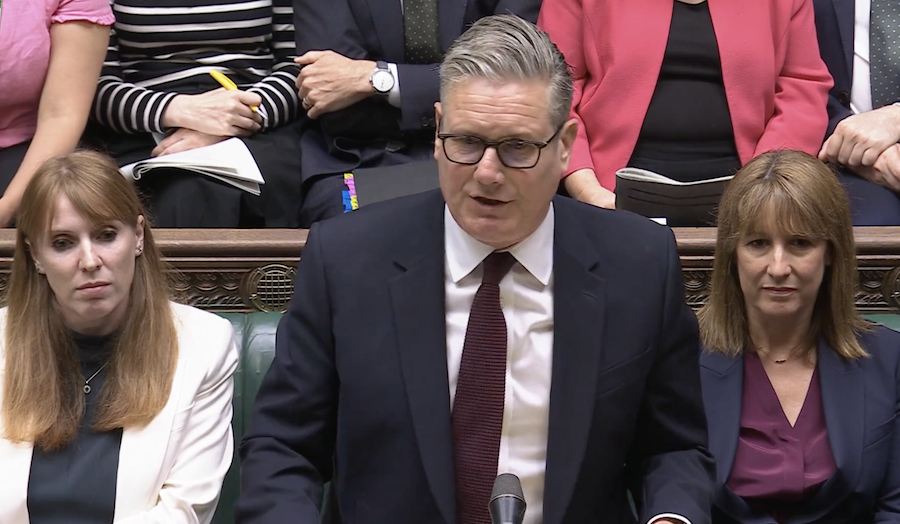Kemi Badenoch and Keir Starmer clearly didn’t spend their summer breaks working on their performances at Prime Minister’s Questions. Today’s exchanges between the two leaders fell quickly into the usual meandering grudge match of accusations about blowing up and running down the economy, and ministers resigning or not resigning. Each question was ostensibly about the economy but included a barb about Angela Rayner’s tax affairs, and each answer offered a rambling defence of Labour’s policies, the standard criticism of Tory mess and a defence of Rayner. We learned very little, and Starmer was neither under pressure nor impressive.
Mind you, perhaps we did learn that Starmer is more prepared to be effusive about Rayner than he was about Rachel Reeves earlier in the summer: he took care to say he was proud to have her alongside him on the front bench. He also emphasised how difficult it had been for her to apply to lift a court order which protected details of her housing and financial arrangements for her son, who has special educational needs. That lengthy praise and defence of the Deputy Prime Minister came in his first answer, which was also a response to Badenoch asking when the last time the cost of government borrowing was so high. On that, Starmer told the Commons he was not going to take lectures on the economy from the party opposite.
Starmer was more energised in criticising the smaller parties than he had been in attacking Badenoch
Badenoch rather acidly pointed out that ‘I’m not sure we would have heard all that sympathy if it was a Conservative deputy prime minister who was being attacked.’ She added that ‘if he had a backbone, he would sack her’. She then included in her reprise of the question about government borrowing being so high a defence of the Tory economic record, saying the Conservatives had ‘left him the fastest-growing economy in the G7’. Starmer responded that ‘if it had been the party opposite, there wouldn’t be the accountability that there now is’, and made a joke about Badenoch’s claim she had been offered a place at Stanford when she was 16.
The Tory leader moved onto former members of the Monetary Policy Committee ‘warning we are heading for a crash’. She then went back to why borrowing costs were so high, this time with the argument that the markets thought Starmer was ‘too weak to control spending’. In response, the Prime Minister quoted an interview Badenoch had given where she had said, ‘I’ve inherited a gigantic mess and I’m cleaning it up, it’s going to take a while.’ He added that ‘I know exactly how she feels’.
Badenoch’s questions continued to be a bit messy: she returned to the Rayner story, saying ‘we’re not the ones referring ourselves to ethics advisers’ before complaining that the country was going to have to wait until 26 November for the Budget. This allowed Starmer to joke that the Conservatives not referring themselves to ethics advisers was ‘one of the reasons they got booted out’. He added a few automated lines about the Tories blowing up the economy and taking no lessons from them.
The final question from the Tory leader was quite good, though it could have been delivered better. It was designed to sum up how adrift Starmer seems already as a leader. Badenoch said:
This week he had another reset. This morning the Prime Minister scrapped his five missions, and after scrapping his three foundations, scrapping his six first steps for change and his seven pillars for growth, the truth is this man has got no clue, zero clue. But this is serious, the Prime Minister’s incompetence is hurting real people.
Starmer continued to talk about putting out Tory fires.
As is so often the case these days, the second half of the session was more revelatory. Starmer gave Ed Davey grief for refusing to come to the state banquet for Donald Trump after the Lib Dem leader asked about Gaza, but the Prime Minister also said that the ‘horrifying’ situation in Gaza was a ‘man-made famine’ that he would be raising with all leaders.
In his second question, Davey asked Starmer to rule out withdrawing from or suspending the European Convention on Human Rights (ECHR). Starmer’s answer showed how far politics has moved on this matter in just a few months. He said:
We will not withdraw from the ECHR. We do need to make sure that both the convention and other instruments are fit for the circumstances we face at the moment and therefore, of course, we have been, as we made clear, looking at the interpretation of some of those provisions. It would be a profound mistake to pull out of those instruments because the first thing that would follow is every other country in the world that adheres to these instruments would pull out of all their agreements with this country. That would be catastrophic for dealing with the problem that we’re actually dealing with.
Starmer was more energised in criticising Davey and the leaders of the smaller parties than he had been in attacking Badenoch. As you’ll have seen from the account above, the Prime Minister uses the same lines every week about the Tory leader and sees her exchanges largely as something to get through. But he took care to accuse Davey of not showing leadership on the Trump issue, to mock the new leader of the Green party for his ‘very strange comments about women’, and to accuse Nigel Farage of flying to America to ‘badmouth and talk down our country’ and of having ‘gone there to lobby the Americans to impose sanctions on this country to harm working people’. He added: ‘You cannot get more unpatriotic than that.’
It’s almost as though the threat to Labour comes from the parties chipping away at its foundational vote, rather than the Tories opposite.








Comments